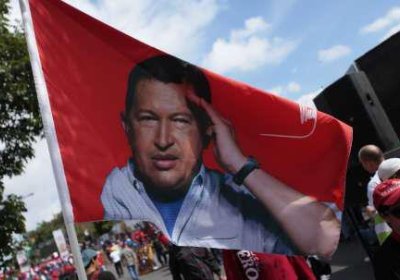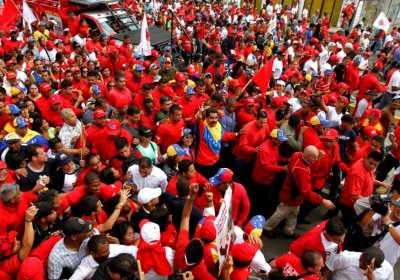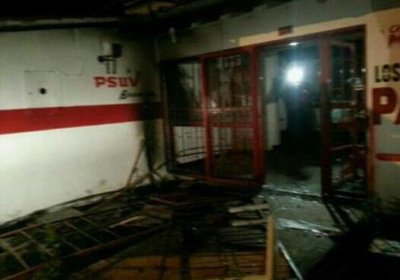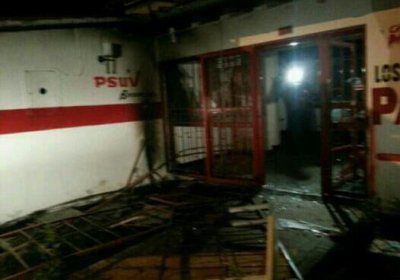Venezuela's new Labour Law for Workers came into effect on May 7, guaranteeing shorter working hours, longer maternity leave and pensions for all Venezuelans.
Described by the Venezuelan government as the “most advanced labour law in the world”, the law reduces the working week from 44 hours to 40, and requires that employers provide two consecutive days a week off.
When the law came into effect, labour minister Maria Iglesias said the new working hours are part of the process towards a “just distribution of wealth”.
Venezuela
The open letter printed below, which was sent to the New York Times public editor Margaret Sullivan was signed by more than a dozen experts on Latin America and the media. Signatories to the letter, released on May 14, signatories included academic Noam Chomsky, filmmaker Oliver Stone, Venezuela Analysis founder Gregory Wilpert and several other experts. To join the campaign, visit New York Times Examiner.
* * *
Dear Margaret Sullivan,
About 100 people packed into the Gaelic Club on May 10 for the Politics in the Pub forum: "Venezuela — A New Democracy or a Command Capitalist State?" Speakers were Latin America’s Turbulent Transitions co-author Federico Fuentes and Latin American studies post-graduate Rodrigo Acuna.
The speakers rejected the "Command Capitalist State" definition of Venezuela today.
It would be hard to find somewhere that celebrates May Day more enthusiastically than Venezuela. But this year celebrations were marred by claims made in a document that could easily be mistaken for a lift-out from a UFO enthusiasts' magazine.
On this May 1, a day of international working class solidarity, we in the Philippine labor and progressive movement, stand with the Venezuelan working class and the people of Venezuela in their struggle to elect the government of their choice to pursue their demands and goals for Socialism of the XXI century.
We congratulate Nicholas Maduro from the Partido Socialista Unido de Venezuela on his election victory and condemn the destabilisation campaign conducted by the US backed opposition coalition of Capprilles to undermine the election results and the newly elected government.
There were large marches in Caracas by supporters and opponents of venezuela's revolutionary government on May 1, as well as smaller ones around the country, to mark International Workers Day. Government supporters celebrated a minimum wage rise and a new labour law that extends workers' rights. Government opponents, however, demanded a “fair wage”.
President Nicolas Maduro marched with the pro-government march in Caracas, while opposition leader Henrique Capriles marched with his supporters in the eastern part of the capital.
This speech was given at a rally in Sydney on April 19 as part of a global day of solidarity with Venezuela.
* * *
Sadly, we have been witnessing over the last few days a course of events that has been all too familiar in our time, especially in Latin America.
The world's richest state, the one that has just 5% of the population but consumes 25% of the world's fossil fuels, produces 72% of the world's waste and accounts for nearly half of the world's military spending, conspires to destabilise a democratically elected progressive government through violent means.
Most of the news on Venezuela in the week since the April 14 presidential election focused on the efforts of losing candidate Henrique Capriles to challenge the results. But another campaign, based in Washington, was quite revealing ― and the two were most definitely related.
Without Washington's strong support ― the first time it had refused to recognise a Venezuelan election result ― it is unlikely that Capriles would have joined the hardcore elements of his camp in pretending the election was stolen.
On April 23, Chris Carlson wrote at Venezuela Analysis:
*** Opposition leader Henrique Capriles claimed yesterday that the presidential elections were “stolen”, and demanded further audit measures that the Venezuelan government has said are “impossible”.
Capriles made the statements during a press conference on Wednesday in which he gave the government an ultimatum regarding the audit.
The New York-based National Lawyers Guild released a statement on April 16 on the Venezuela elections it helped monitor. An NLG spokesperson said: "The U.S. would do well to incorporate some of the security checks and practices that are routine in Venezuela to improve both the level of participation and the credibility of our elections."
The full statement is below.
* * *
As the Venezuelan opposition is emboldened by chaos on the streets, reactionary propaganda on the private airwaves that still dominate Venezuela's media landscape and firm support from Washington, now is the time for the international left to galvanise support for the Bolivarian revolution.
Under the false pretext of electoral fraud, the right-wing opposition leader Henrique Capriles tried for a power grab after losing presidential elections on April 14, threatening to destabilise the country.
“The coup has already been defeated” declared Nicolas Maduro, the winner of the April 14 presidential elections, mid-morning on April 16. By that time, seven people had been assassinated by fascist bands who were activated the night before in attacks at headquarters of the governing Unified Socialist Party of Venezuela (PSUV), popular health centres and houses recently turned over by the government to displaced families.
Also at that point of the day, the call for a general strike did not materialise. The call was made by the fascist high command led by the failed candidate of April 14.
- Previous page
- Page 45
- Next page








